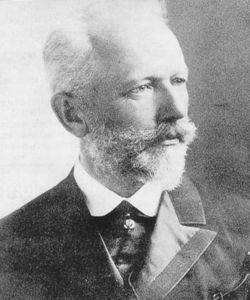Pyotr Ilyich Tchaikovsky: Difference between revisions
imported>Charles Sandberg No edit summary |
imported>Ro Thorpe m (restored original order) |
||
| Line 1: | Line 1: | ||
[[Image:Tschaikowski.jpg|thumb|right|250px|Pyotr Ilyich Tchaikovsky.]] | [[Image:Tschaikowski.jpg|thumb|right|250px|Pyotr Ilyich Tchaikovsky.]] | ||
'''Pyotr (Peter) Ilyich Tchaikovsky''' (25 April [7 May] 1840 – 25 October [6 November] 1893) was one of the most popular [[Russia|Russian]] composers of all time. His music has come to be known and loved for its distinctly Russian character as well as for its rich harmonies and stirring melodies. His compositions are among the most frequently performed in the world. Tchaikovsky composed 7 symphonies, 11 operas, 3 ballets, 5 suites, 3 piano concertos, a violin concerto, 11 overtures, 20 choral works, 4 cantatatas, 3 string quartets, a string sextet, and over 100 songs and [[piano]] pieces. Yet all the while he was obliged to conceal his [[homosexual|homosexuality]] | '''Pyotr (Peter) Ilyich Tchaikovsky''' (25 April [7 May] 1840 – 25 October [6 November] 1893) was one of the most popular [[Russia|Russian]] composers of all time. His music has come to be known and loved for its distinctly Russian character as well as for its rich harmonies and stirring melodies. His compositions are among the most frequently performed in the world. Tchaikovsky composed 7 symphonies, 11 operas, 3 ballets, 5 suites, 3 piano concertos, a violin concerto, 11 overtures, 20 choral works, 4 cantatatas, 3 string quartets, a string sextet, and over 100 songs and [[piano]] pieces. Yet he was criticized by Russian critics for being insufficiently nationalistic, and all the while he was obliged to conceal his [[homosexual|homosexuality]]. His disastrous marriage was the subject of [[Ken Russell]]'s [[1970]] film ''[[The Music Lovers]]''. | ||
== Biography == | == Biography == | ||
Revision as of 09:45, 11 November 2007
Pyotr (Peter) Ilyich Tchaikovsky (25 April [7 May] 1840 – 25 October [6 November] 1893) was one of the most popular Russian composers of all time. His music has come to be known and loved for its distinctly Russian character as well as for its rich harmonies and stirring melodies. His compositions are among the most frequently performed in the world. Tchaikovsky composed 7 symphonies, 11 operas, 3 ballets, 5 suites, 3 piano concertos, a violin concerto, 11 overtures, 20 choral works, 4 cantatatas, 3 string quartets, a string sextet, and over 100 songs and piano pieces. Yet he was criticized by Russian critics for being insufficiently nationalistic, and all the while he was obliged to conceal his homosexuality. His disastrous marriage was the subject of Ken Russell's 1970 film The Music Lovers.
Biography
Early life
Tchaikovsky was born to a middle class family Votkinsk, Russia. He went to St. Petersburg to study law before being taught music at the St. Petersburg Conservatory. Among his mentors was Russian composer and pianist Anton Rubenstein. Tchaikovsky became professor of harmony at the Moscow Conservatory, where he met dramatist Aleksandr Nikolayevich Ostrovsk, who wrote the libretto for the composer's first opera, The Voyevoda. He also wrote his first symphony, Winter Daydreams.
Middle life
coming soon
Fame
coming soon
Later life
coming soon
Music
Style
Types of music
Operas
Ballets
Orchestral Music
Fantasy Overtures
Concertos
Chamber Music
Piano Pieces
Vocal Pieces
Selected works
- 1866 Symphony #1, Winter Daydreams
- 1868 Fate, symphonic poem
- 1869 Romeo and Juliet, fantasy overture
- 1871 String Quartet in D major
- 1872 Symphony #2, Little Russian
- 1873 The Tempest
- 1874-5 Piano Concerto #1
- 1874-5 String quartet in F
- 1875 Swan Lake, ballet
- 1875 Symphony #3, Polish
- 1875 String quartet in Eb
- 1876 Variations on a Rococo Theme
- 1876 Slavonic March
- 1877 Symphony #4
- 1877 Francesca da Rimini
- 1877 Waltz Scherzo
- 1878 Violin concerto in D
- 1878 Suite # 1
- 1879 Eugene Onegin
- 1879 Capriccio Italien
- 1879 Piano Concerto #2
- 1880 Serenade for Strings
- 1880 Romeo and Juliet (final revision)
- 1881 Joan of Arc, opera
- 1882 1812 Overture
- 1882 Piano trio in A minor
- 1883 Suite #2 Mazeppa, opera
- 1884 Suite #3
- 1884 Concert -fantasy
- 1885 Manfred Symphony
- 1887 Suite #4, Mozartiana
- 1888 The Sleeping Beauty
- 1888 Hamlet, overture
- 1888 Symphony #5
- 1890 The Queen of Spades
- 1892 Iolanthe
- 1892 The Nutcracker
- 1892 String Sextet
- 1893 Symphony #6, Pathetique
- 1893 Piano Concerto #3
